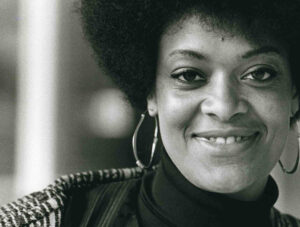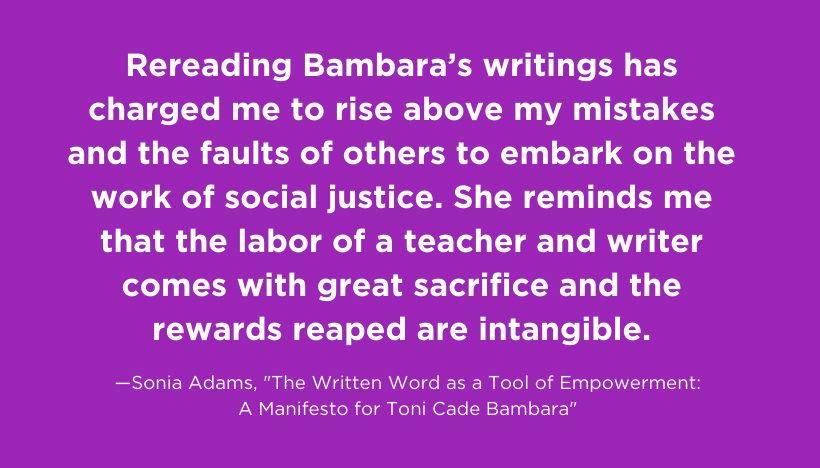This post was written by NCTE member Sonia Adams.
The systemic violence inflicted against Black, Brown, Black Indigenous, and Brown Indigenous peoples is, in no uncertain terms, a global pandemic. The deaths of George Floyd, Breonna Taylor, David Dungay, Regis Korchinski-Paquet, Simeon Francis, and Elijah McClain stirred my spirit in such a profound way. Restlessness and despair morphed into a righteous anger. After days of prayer and reflection, the urgency to act was inevitable. I needed to be an active participant in creating change in the world. I needed to embrace social justice activism wholeheartedly.
Engaging in discussions on societal ills or teaching socially-conscious literature is constructive but the thrust in social justice proves instructive and life-affirming. I’ve decided to pursue the written word as a tool of reformation and empowerment.
As an academic, there is an unwritten code where you’re expected to use your position of authority to speak to social and political issues impacting education as well as the global society. My work thus far in cofacilitating professional development workshops for professors and teaching global literature has been fruitful, but it can be deepened in critical thought.
Drawing Insight and Inspiration from Toni Cade Bambara

I returned to the writings of Toni Cade Bambara for insight and inspiration. At this present moment, society is dealing with Covid-19 epidemic, casual acts of police brutality against marginalized people and communities, and overwhelming rates of unemployment. The revolutionary fervor of the #BlackLivesMatter Movement at work across the globe is galvanizing people to protest against a myriad of oppressions but also to educate themselves and others on its roots ingrained in systems of power. So, I seek Bambara’s writings to educate me on social justice activism.
During Bambara’s tenure as an English instructor for the Search for Education, Elevation, and Knowledge (SEEK) program at City College, she devised a critical pedagogy rooted in student-centered instruction and learning. In the Summer 1968 Seek Report “Realizing the Dream of a Black University” & Other Writings, she explains the role of the teacher: “I think a good teacher provokes rather than assuages, raises questions rather than provides answers, allows the students to discover techniques rather than teaches them, and equips the students with skills so that [they] can sever ties with the teacher quickly and teach [themselves].”
Bambara advocates for an inquiry-based teaching practice in which instructors equip students with knowledge and skills to become active autonomous agents over their education. Instructional strategies gleamed from Bambara’s critical pedagogy are as follows:
- The instructor asks open-ended questions to foster critical thinking as well as verbal and written communication skills.
- The instructor encourages critical engagement with course texts and materials relevant to students’ interests and needs.
- The instructor sustains exchange and validation of ideas and issues raised in class discussions and elicits student input on the trajectory of the course content, learning activities, and required assignments, which permits students to assert agency in the learning process.
According to Bambara, student-centered learning necessitates self-discovery, autonomy of voice, investigation, and a dialogic exchange of ideas. Here are some learning strategies that are simply irresistible:
- Students must make the learning process applicable to themselves through course design initiatives and service-learning projects, including selection of course texts and development of course assignments and research topics.
- Students expound on their knowledge within and outside the classroom—families, communities, place of employment, activist work, etc.
- Students fill in the credibility gaps in “official” versions of western histories and sciences, colonial politics, media platforms, and standardized education policies which perpetuate racist, sexist, and classist ideologies and exploitive systems of power.
- Students must become informed about issues of equity, diversity, and inclusion which directly impact their positionality within the academy.
The gatekeepers of colleges and universities during the 1960s made attempts through open admissions policies and precollege skills courses and programs like SEEK to prepare students from traditionally marginalized groups to successfully graduate and become marketable to employers. However, the gatekeepers created loopholes that meant degree programs and courses across the curriculum didn’t validate the lives and experiences of low-income, single-parent, and immigrant students of color.
Bambara witnessed this and strove to move these students to act. During the student protest movement at City College, she mobilized students of color with effective strategies for demanding reform and representation. In the classroom, Bambara engaged her SEEK students in dialogic reading, critical research, and writing tasks. Campus student protests and student-centered learning fueled Bambara’s creation of service-learning projects.
Bambara’s Narrative Strategies at Work
As editor of Tales and Stories for Black Folks, Bambara featured stories from some of her students. She created a service-learning project in which students would visit a community center to work with kids in adapting western nursery rhymes relevant to Black folk life. In the introduction to the anthology “Our Great Kitchen Tradition,” Bambara comments on the Black Oral Tradition: “It is equally important for young folks to learn how to listen, to be proud of our oral tradition, our elders who tell their tales in the kitchen. For they are truth.” The kitchen becomes a transformative space where the act of call-and-response permits young Black folks to learn their lineage of resistance to oppression and the essence of reading and listening to folk stories for learning and empowerment.
“The Three Little Panthers,” cowritten by Bambara and Geneva Powell, is modeled on the activism of the Black Panther Party. The three panthers are given a homework assignment from their Freedom School, designed to test their survival skills in the forest, the “suburbs of the wilderness.” Upon completing the homework assignment, the little panthers learn about colonization and cultural assimilation, how they are expected to “learn to eat the food, talk the language, listen to the music, and participate in the nonsense these creatures of the suburbs called their ‘culture’” like the other creatures of the forest, as well as to use self-defense tactics to secure their house and reject gifts like the books “that didn’t say one word about panthers and their history.” The three little panthers learn the tenets of self-empowerment and anti-colonial resistance through student-centered learning. Powell and Bambara’s use of Black English and Black Nationalist references affirmed Black young readers in having determination to stand against domination.
Bambara’s short story “Broken Field Running” centers on Dada Lacey and Ndugu Jason, who are teachers of a Black Liberation School in an unnamed inner-city neighborhood. Dada is a Yoruba title for a sensitive woman who exudes “balance and harmony.” Ndugu is an East African universal title meaning comrade, relative, associate. As these budding teachers take their class home, the students apply lessons learned to examine dire conditions within their community.
Malaika shares a lesson on economic inequity: “There’s poor people cause there’s rich people. . . . And there’s rich people cause they steal from the poor, right? . . . I just figured that out.” At the Jiffy Mart, Vincent uses hot chocolate as model for instructing his peers on health and nutrition: “This got calcium in it for teeth and bones, and vitamins and protein for growth . . . on account of the milk.” Abdul shares his weather report for the local radio station: “Well, mostly I’ll tell people to get their mittens out, to wear a cap with ear flaps, and to scoop up two fingers of Vaseline, cause tomorrow gonna be meaner than today.”
Despite the Dada Lacey’s ability to impart student-centered learning and civic responsibility to her students, she struggles with self-doubt to empower her community. Ndugu Jason reminds Dada Lacey of their shared commitment in preparing their pupils for the future: “that Western civilization is already in the past for most of the Third World? We’ve got to prepare the children faster. Time’s running out. . . . I mean, a whole new era is borning and here we are trudging along Hough Avenue like fossils?”
Ndugu Jason articulates a radical pedagogy where book knowledge and living experiences serve as tools for envisioning social justice as a reality for Black people. As the teachers reach the end of their sojourn, Malaika demonstrates her vision of a loving and safe world: “Cause everybody’ll have warm clothes and we’ll all trust each other and can stop at anybody’s house for hot chocolate cause won’t nobody be scared or selfish. Won’t even be locks on the doors. And every sister will be my mother.” This inspires Dada Lacey to keep pressing forward in fighting injustice. Bambara’s narrative strategies of using Black English, Black Nationalist tenets of community empowerment and self-actualization, and the Pan-Africanist titles of “Ndugu” and “Dada” validate Black leadership and authenticate Black life.
Bambara’s Lineage of Activism and Empowerment
I could relate to Dada Lacey’s disillusionment and despair experienced early in my teaching career. I allowed administrators’ fickle actions and students’ behavioral problems and lack of motivation to hinder my purpose as an educator.
Rereading Bambara’s writings has charged me to rise above my mistakes and the faults of others to embark on the work of social justice. She reminds me that the labor of a teacher and writer comes with great sacrifice and the rewards reaped are intangible.
One of the central tenets of the #BlackLivesMatter network is to “recommit to healing ourselves and each other, and to cocreating alongside comrades, allies, and family a culture where each person feels seen, heard, and supported.” I believe that Bambara embodied this tenet through her roles as a mother, daughter, feminist, community scribe, activist, filmmaker, editor, Pan-Africanist, writer, and teacher. I follow her lineage of activism as an African American woman, avid reader, feminist thinker, and educator committed to the empowerment of Black Diasporic folks.
Thank you, Toni Cade Bambara, for embodying truth, joy, and commitment to a world that falters but remains.

Sonia Adams is an English educator and PhD candidate from New York City. Her scholarship is centered on multicultural feminist studies, contemporary US multiethnic and global women’s literatures, and social justice interventions in English studies instructional design and curricular development.
It is the policy of NCTE in all publications, including the Literacy & NCTE blog, to provide a forum for the open discussion of ideas concerning the content and the teaching of English and the language arts. Publicity accorded to any particular point of view does not imply endorsement by the Executive Committee, the Board of Directors, the staff, or the membership at large, except in announcements of policy, where such endorsement is clearly specified.

